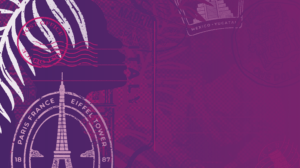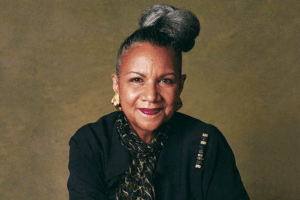By Gwen McKinney
As a nod to Summertime Fine, we turn to some of our earlier posts to mark the lazy daze of summer. Travel and vacations signify our best way to escape.
Black women’s travel holds promise and peril. From the Green Book to expat communities, we have always found innovative ways to move about in the world. We share a few experiences of life’s journeys.
Black people began dreaming beyond the American shoreline soon after their arrival. Centuries later, spurred by racist policies, a need for political and professional affirmation, and an expanded worldview following World War 1, an exodus began to build lives in other countries, with new languages, cultures and possibilities.
Here we feature Black woman expatriates—growing in numbers in recent years—and the experiences that led her elsewhere. Take a listen to our podcast from 2022 giving voice to the Expat Experience.
Charlotte Van Horn Exits to Panama
When Charlotte Van Horn moved from Glassboro, New Jersey to Biloxi, Mississippi, the only people she knew who had spent time in another country had gone to Vietnam. Then she met a Panamanian, who she’d eventually marry, and the transition began.
“I didn’t even know where Panama was on the map,” confides Van Horn, formerly a legal secretary. She has since built a new home in a gated bedroom community near Panama City where she settled in 2010.
“Before I made the move, no one could tell me there was any place in the world better to live than the U.S.A.”
Today, Charlotte Van Horn is a certified SisterLocks specialist who commands a thriving organization, Black Expats In Panama (BEIP). Launched in 2019, the goal is to assist Black Americans transition to that Central American country, by providing resources, cultural enrichment and diversity
Van Horn says BEIP, offering ‘travel with a purpose tours’ and resettlement support, grew out of a need to foster kinship to a community of mostly Black women who shared connections and lived experiences that they left behind in the states. “The result was something magical.”
She witnessed a rapid uptick in resettlement between 2019 and June 2020, hastened by the pandemic, the George Floyd murder and what Van Horn calls the weight of the hostile political climate colliding with Black people’s need to find refuge outside the land of their birth.
The Black expat movement is not new, dating back more than 100 years. Following World War I, a cadre of artists and political activists issued their discontent with their feet, spanning out and winning acceptance by a global community.
It included celebrated intellectuals, before and after the Harlem Renaissance, led by artists and activists like Josephine Baker, Langston Hughes, James Baldwin, Maya Angelou and Nina Simone.
Today, the mass exodus to far-flung countries includes untold millions of lesser known Black American expats. There is no census data on this population, but it is believed the vast majority are women — many retired, others working remotely — seeking solace, serenity, adventure or opportunities not found stateside.
The Up and Down Sides of Expatriation
UpSide
Peace of Mind. First and foremost, you leave behind the trauma of racial discord, traded for a safety and security that allows you to exist without fear of “breathing while Black.”
Economic Independence. In Panama and most developing countries your lifestyle is enhanced by a cost of living that carries you and your American green backs further than you could ever go in the states.
American Experience. Technology and advancements in the most developed nation on earth comes with built-in advantages drawn from our exposure and understanding of how to translate circumstances into opportunities. “In the states you may be an everyday Joanne,” says Van Horn, “But in Panama, you can be a Super Star.”
Welcome Weather. Outside of the hurricane belt, just north of the Equator and centered within the tropical rainforest, Panama enjoys 12 hours of daylight and warm temps that vary between 75 and 90 degrees.
DownSide
Homesick & Alone. Many folks relocate without realizing the impact of leaving family and loved ones behind until they’ve made the move. Feelings of loneliness and isolation sometimes creep in, especially in the early days of relocating.
Language Barriers. Unless you are fluent in Spanish, relocation can be difficult. Although many Panamanians are bilingual and welcome opportunities to engage in English, you are often out of the loop when you are not at least conversant in the native tongue.
Cultural Challenges. Even the humblest of us wear our Americanism on our sleeves. The clash of cultures is often subtle and unspoken for the usually outspoken American. There is a steep learning curve calibrating who we are in the context of where we are, and clearing the hurdles of being culturally foreign.
Access and Ease. When you’re used to modern convenience, creature comforts and access to quick and reliable resources at your fingertips, huge adjustments must be built into your resettlement plan as you trade access and ease for a slower, simpler pace.
(First posted May 16, 2022)





